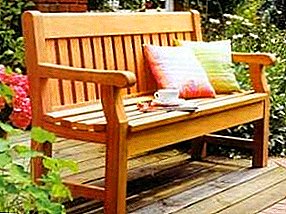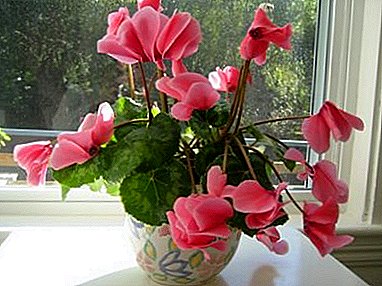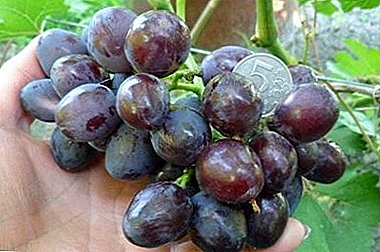 Bright petunia is a fragrant plant, a colorful symbol of a carefree summer, which you unwittingly admire, each time passing by a blooming flower bed. Such a variety and pomp of color, like a petunia, can envy any garden annual flower. If you decide to add bright colors to your bed, pay attention to petunia, because it will not be difficult to grow and propagate it with seeds or cuttings.
Bright petunia is a fragrant plant, a colorful symbol of a carefree summer, which you unwittingly admire, each time passing by a blooming flower bed. Such a variety and pomp of color, like a petunia, can envy any garden annual flower. If you decide to add bright colors to your bed, pay attention to petunia, because it will not be difficult to grow and propagate it with seeds or cuttings.
Did you know? The first petunia flower, described in the story, was white and was found in Uruguay in 1973. Petunia was originally called nicotini in Latin, later it was renamed petun, which means tobacco in Portuguese, because petunia and tobacco are related plants.
How to grow petunia from seed
In this topic, we will look at how to properly plant petunia seedlings by seed. If you are a novice grower, then for convenience it is better to choose granulated seeds. Petunia has very small seeds (1 g -10 000 seeds), so if you have not found granulated seeds, then for the convenience of sowing, simply mix the usual ones with sand in a ratio of 1: 5. Another trick from experienced gardeners is to plant seeds in a layer of snow laid on top of the soil. This will give additional moisture and allow you to see whether the seeds are evenly scattered.
When Petunia Seeds Are Sown
 There is no specific time frame when it is necessary to plant petunia on seedlings. Terms of sowing depend on the time you expect flowering and which variety you prefer: small-color (blooms 75 days after sowing) or large-flowered (after 90). You can sow seeds in February, but then you must ensure that they are constantly highlighted. If the flowering time is not critical, then it is best to sow in March and with a large margin, since not all seeds sprout due to the short daylight hours.
There is no specific time frame when it is necessary to plant petunia on seedlings. Terms of sowing depend on the time you expect flowering and which variety you prefer: small-color (blooms 75 days after sowing) or large-flowered (after 90). You can sow seeds in February, but then you must ensure that they are constantly highlighted. If the flowering time is not critical, then it is best to sow in March and with a large margin, since not all seeds sprout due to the short daylight hours.
How to prepare a substrate for planting petunias
Petunia loves non-alkaline, moisture-absorbing and loose soils, therefore, a special primer is usually prepared for it. It is necessary to mix in equal quantities the turf ground, humus and peat. If you have ready soil, add more pre-washed sand in the ratio of 5: 1. Before temkak to sow the seeds of petunia, the prepared land must be further enriched with substrate. The recipe for its preparation is quite simple: 5 kg of soil mixed with 500 g of ash, 250 g of perlite and a tablespoon of potassium sulfate. If there is no potassium sulphate, replace it with any other fertilizer with a high content of this element. Then mix everything, pour heavily and leave for a day.
How to plant petunia seeds
First you need to choose a container for planting, it can be plastic boxes, small pots. Some gardeners use food containers with lids, they make good mini-greenhouses that allow you to maintain the desired temperature. In addition, they well pass the light needed for seedlings, and are easily ventilated. Place a claydite drain at the bottom of the selected container, and then part of the prepared soil, gently pressing. Sift the remaining part through a large sieve and lay the top layer about an centimeter thick. Sprinkle seeds on top, sprinkle with water from a spray bottle. You do not need to fill the seeds with soil on top, so small seeds can not get out of the ground. After disembarking, cover the container with a plastic cap, glass or cloth.
Necessary conditions for the emergence of seedlings
 If you have done everything as described above, the first shoots will appear a week after planting. To get healthy seedlings, knowing how to plant a petunia is not enough. From the moment the seeds are planted, certain conditions that this crop loves should be observed. First of all, provide seedlings sufficient lighting, including dim light at night. Secondly, constantly maintain the temperature of 22-25 ° C. During this time, the main task is to maintain a high humidity and prevent an excess of moisture and moisture, which leads to the disease of the plant black leg. Therefore, you need every day to wipe the film or glass, which covered the "greenhouse" from condensation.
If you have done everything as described above, the first shoots will appear a week after planting. To get healthy seedlings, knowing how to plant a petunia is not enough. From the moment the seeds are planted, certain conditions that this crop loves should be observed. First of all, provide seedlings sufficient lighting, including dim light at night. Secondly, constantly maintain the temperature of 22-25 ° C. During this time, the main task is to maintain a high humidity and prevent an excess of moisture and moisture, which leads to the disease of the plant black leg. Therefore, you need every day to wipe the film or glass, which covered the "greenhouse" from condensation.
Did you know? At present, hybrids capable of withstanding frosts down to -4 ° C have been obtained, they can be grown in the southern regions as perennials. This quality allows petunias growing in pots or hanging pots to delight the eye until November.
How to care for petunia seedlings
To get a beautiful and plentiful color of petunia, follow a few simple rules for caring for seedlings. Liberally water and spray the seedlings with a light solution of potassium permanganate, otherwise the seedlings die when the soil dries out and hardens. You need to water them from the pallet or under the root so that there are no drops on the leaves.
When the first shoots appear, we begin to air them, gradually increasing the time spent in the open air. An abrupt change in temperature can lead to the death of young plants. The first four to five weeks, the seedlings will grow very slowly, but this is normal: the plants form a root system. Therefore, if you notice that the roots have filled the whole clod of earth, you need to transplant petunia into a large container.
Pickling seedlings
 When the first leaves appear at the seedlings, they are diving, that is, they are seated. This allows you to strengthen the root system of seedlings before planting them in open ground. Pre-moisten the soil, gently pry the seedling with a wand and remove it, while not trying to shake off the soil. Dive seedling in a pot with the same mixture of soil. After opening the plants, pour them over, cover with paper and continue to regularly wet and loosen the soil. A week after the picking, they start feeding the seedlings. Nitrophoska, Kemira, Mortar, and other water-soluble fertilizers per 20-30 g per 10 liters of water are well suited. In order to "harden" the plant, we continue to gradually reduce the temperature in the daytime to 18-20 degrees, at night to 15-16 ° С. To get a bush beautiful and lush, grow shoots need to zaschpnut. Under these conditions, with good lighting and plenty of moisture you get a healthy and high-quality seedlings.
When the first leaves appear at the seedlings, they are diving, that is, they are seated. This allows you to strengthen the root system of seedlings before planting them in open ground. Pre-moisten the soil, gently pry the seedling with a wand and remove it, while not trying to shake off the soil. Dive seedling in a pot with the same mixture of soil. After opening the plants, pour them over, cover with paper and continue to regularly wet and loosen the soil. A week after the picking, they start feeding the seedlings. Nitrophoska, Kemira, Mortar, and other water-soluble fertilizers per 20-30 g per 10 liters of water are well suited. In order to "harden" the plant, we continue to gradually reduce the temperature in the daytime to 18-20 degrees, at night to 15-16 ° С. To get a bush beautiful and lush, grow shoots need to zaschpnut. Under these conditions, with good lighting and plenty of moisture you get a healthy and high-quality seedlings.
Did you know? Crazytunia hybrid petunias have flowers that change color depending on the period of development and temperature, for example, from lemon yellow to purple.
Planting of seedlings in open ground should be carried out when the spring frosts are over. If you sowed seeds in March, then by about mid-May, the seedlings are ready for planting. Before that, it is advisable to hold the seedling containers in a cool place for a little bit, so that it gets used to the new temperature conditions. Plot choose open and sunny, but we spend the landing itself in the evening or an overcast day. Before transplanting, it will be very useful to introduce compost or humus into the soil, but not manure, it can cause the development of a fungus. Pre-well moisten the seedlings in pots and transplant it together with an earthen clod at a distance of 35-50 cm from each other, then water it.
How to root a petunia, growing plants from cuttings
 Now consider how to grow and multiply petunia cuttings. In this way, mainly terry and ampelous petunias are grown. Many gardeners consider grafting to be the most reliable, since it provides almost complete rooting and is easier to maintain. The main advantage of growing petunias from cuttings is earlier than that of seeds, flowering - in 25-35 days.
Now consider how to grow and multiply petunia cuttings. In this way, mainly terry and ampelous petunias are grown. Many gardeners consider grafting to be the most reliable, since it provides almost complete rooting and is easier to maintain. The main advantage of growing petunias from cuttings is earlier than that of seeds, flowering - in 25-35 days.
When and how to prepare petunia cuttings
There are several secrets how to properly cutting a petunia. The main ones relate to the time of harvesting cuttings and their proper pruning. The cutting time depends on the type of petunia: for terry is harvested at the end of February - beginning of March, ampelnaceae can be grafted at any time of the year, provided the air temperature is maintained at 22-25 ° С and regular highlighting. In a healthy uterine plant, the apical cuttings with 4-6 leaves up to 10 cm long are cut at an angle. The top cuttings of the cutting are carefully cut in half and planted ¼ length into the soil prepared the same way as for the seeds. It is good to do cuttings of petunia in trays for seedlings or plastic cups of 500 g. Cuttings are placed at a distance of about 2 cm from each other and covered with glass.
How to root petunia, substrate preparation
The use of a growth stimulator for rooting petunia is not necessary. The substrate for the soil is prepared in the same way as for planting seeds, additionally fit the top layer of sand 2 cm watered with fungicide. Freshly cut cuttings are planted immediately, because their ability to root quickly decreases. Properly prepared and planted seedlings are usually rooted after a week in terry and ampel petunias and after two in calibrakhoa.
Important! In the case of repeated breeding of petunias by cutting, do not use the same soil.
Rules for the care of the handle
When cutting a petunia, the rules for the care of seedlings are the same as for the care of seedlings. It is necessary to monitor the soil moisture and spray cuttings from the sprayer, while avoiding dampness; maintain a temperature of 22-24 ° C and provide continuous highlighting. The ammune petunias and calarahoa love a lot of space, so their pots are hung. 
Important! If a black foot appears in case of excessive dampness, you should remove the diseased cuttings, and the remaining ones should be poured with a weak solution of potassium permanganate and slightly open the container for airing..
Pinching petunias
To give the bush a beautiful shape and strengthen the deciduous mass, the seedlings pinch over 4-6 leaf. Moreover, the tops of the shoots, cut off during pinching, perfect for rooting. If necessary, you can repeat pinching in 10-14 days. After about a week, the ampelous and terry petunia takes root, and the calibrahoa takes two weeks. Reproduction of petunia cuttings in the same way produced from seedlings. The main seedlings after cutting the cuttings will thrive and develop even faster, do not be afraid that you will damage it.
Planting cutting
When the cuttings reach a length of 10-15 cm, they are planted in pots of medium diameter. Typically, landing occurs at the beginning or middle of May, when the average daily temperature is above 15 degrees. It is possible to plant cuttings in open ground or hanging pots, then feed them with organic mineral fertilizers. Petunia needs additional feeding during the entire flowering period, it is usually carried out every 10 days with a mullein infusion or vermishim.
Petunia is quite a demanding plant, it often suffers from various fungal and viral diseases, from which there are no drugs. However, if you know how to properly sow and grow a petunia, you can easily avoid the troubles and disappointments in this exciting activity!












